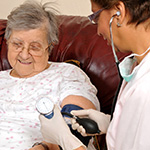
For Physicians & Professionals
“Hospice nurses have unique expertise and an orientation to palliative rather than curative care. Hospice adds a level of care that complements the care I have been providing, a level of care that I am unable to provide even as the patient’s primary physician. Care at the end of life requires a different mind set. My colleagues in hospice are better prepared to provide the right care at the end of life.”
Daniel B. Goodman, MD
Board-Certified Internist, specialization in Geriatric Medicine
Your role as physician does not have to end when your patient enrolls in an end-of-life care program. Since your relationship with the patient may span years or even decades, your continued involvement may be very important in supporting and enriching the patient’s experience.
As the Jewish patient’s primary physician, you are in an excellent position to offer recommendations that are in line with the patient’s ethical and religious values and also reflect their medical condition and likely prognosis. Working toward one common goal, all parties involved are able to alleviate physical and emotional suffering for the patient as well as their family.
-
When Your Patient is Jewish
While the primary role of any physician is to discuss the patient’s diagnosis, prognosis and treatment options, understanding the patient’s perspective and values is crucial to enabling them to make the best choice.
In collaboration with the patient’s primary physician, patients on a Jewish hospice program are cared for by an interdisciplinary team of professionals from diverse fields who coordinate to meet those care goal(s) identified by the patient. They are specially trained in alleviating physical, emotional and spiritual suffering for the patient as well as their family.
In a well-developed Jewish hospice program, like MJHS Hospice, all staff members are sensitive to Jewish religious and cultural preferences. Religious observances will be respected, dietary preferences and kitchen integrity will be maintained, funeral planning can involve the Chevra Kadisha (Jewish communal burial society), and burial on a short timeline – often within 24 hours of the patient’s passing – is often possible.
If you know that your patient or their family observes halachah (traditional Jewish law), look for a Jewish hospice program, such as MJHS’ “Halachic Pathway,” that can assure your patient that a chosen posek (rabbinic advisor) is included in the medical decision-making process. This enables your patients and their families to receive end-of-life care that adheres to their personal religious practice and to Jewish law.
If you identify yourself as a member of an Orthodox Jewish community or if you are working with a patient who identifies as Orthodox, you might also find these articles of interest:
- “Increasing Access to Palliative Care for the Orthodox Jewish Community”
- “Jewish Law (Halachah) and Medical Decision-Making,” AJAS Journal on Jewish Aging
- Prolonging Life in the Shadow of Death: Where Halacha Guidelines and Medical Expertise Meet
For halachic medical forms, please visit our Forms/Advance Directives section.
Other Resources:
-
Your Role When Your Patient Enrolls in Hospice
As the Jewish patient’s primary physician, you are in an excellent position to offer recommendations that are in line with the patient’s ethical and religious values and also reflect their medical condition and likely prognosis.
You can make the important phone call and initiate a referral to Jewish hospice services. When hospice is the right choice for the patient and their family, you can play a crucial role in alleviating physical and emotional suffering for the patient as well as their family.
Visit Facilitating Conversations for helpful tips on communicating with your patients or their hospice medical teams, or visit our Health Resources sections below.
-
Health Resources
Facilitating Conversations
- The Epic Rap Video that Starts the End of Life Conversation
- A Hospice Social Worker on Grief and Empathy
Professional Resources
- The Epic Rap Video that Starts the End of Life Conversation
- A Hospice Social Worker on Grief and Empathy
Jewish Perspectives on End of Life Care
- The Epic Rap Video that Starts the End of Life Conversation
- A Hospice Social Worker on Grief and Empathy
When the Choice is Care not Cure





